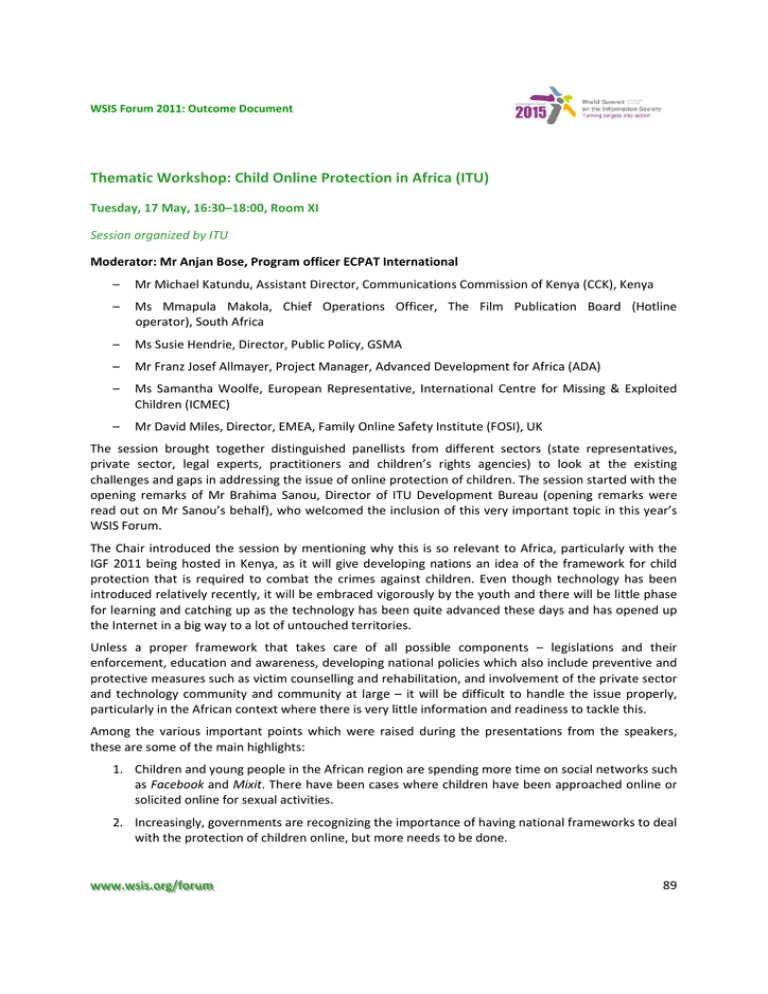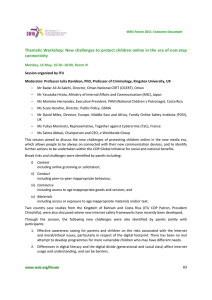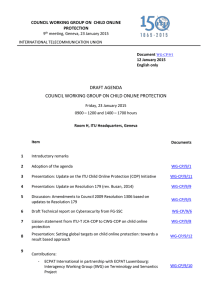Thematic Workshop: Child Online Protection in Africa (ITU)
advertisement

WSIS Forum 2011: Outcome Document Thematic Workshop: Child Online Protection in Africa (ITU) Tuesday, 17 May, 16:30–18:00, Room XI Session organized by ITU Moderator: Mr Anjan Bose, Program officer ECPAT International – Mr Michael Katundu, Assistant Director, Communications Commission of Kenya (CCK), Kenya – Ms Mmapula Makola, Chief Operations Officer, The Film Publication Board (Hotline operator), South Africa – Ms Susie Hendrie, Director, Public Policy, GSMA – Mr Franz Josef Allmayer, Project Manager, Advanced Development for Africa (ADA) – Ms Samantha Woolfe, European Representative, International Centre for Missing & Exploited Children (ICMEC) – Mr David Miles, Director, EMEA, Family Online Safety Institute (FOSI), UK The session brought together distinguished panellists from different sectors (state representatives, private sector, legal experts, practitioners and children’s rights agencies) to look at the existing challenges and gaps in addressing the issue of online protection of children. The session started with the opening remarks of Mr Brahima Sanou, Director of ITU Development Bureau (opening remarks were read out on Mr Sanou’s behalf), who welcomed the inclusion of this very important topic in this year’s WSIS Forum. The Chair introduced the session by mentioning why this is so relevant to Africa, particularly with the IGF 2011 being hosted in Kenya, as it will give developing nations an idea of the framework for child protection that is required to combat the crimes against children. Even though technology has been introduced relatively recently, it will be embraced vigorously by the youth and there will be little phase for learning and catching up as the technology has been quite advanced these days and has opened up the Internet in a big way to a lot of untouched territories. Unless a proper framework that takes care of all possible components – legislations and their enforcement, education and awareness, developing national policies which also include preventive and protective measures such as victim counselling and rehabilitation, and involvement of the private sector and technology community and community at large – it will be difficult to handle the issue properly, particularly in the African context where there is very little information and readiness to tackle this. Among the various important points which were raised during the presentations from the speakers, these are some of the main highlights: 1. Children and young people in the African region are spending more time on social networks such as Facebook and Mixit. There have been cases where children have been approached online or solicited online for sexual activities. 2. Increasingly, governments are recognizing the importance of having national frameworks to deal with the protection of children online, but more needs to be done. www.wsis.org/forum 89 WSIS Forum 2011: Outcome Document 3. The penetration of fixed internet is low and giving way to mobile broadband. The future of Africa relies heavily on mobile networks, hence suitably training operators and building their capacity will go a long way to protect children online. In this regard, the work of a mobile operator in Africa – MTN was highlighted where significant initiative has been launched in relation to protection of children. It was also noted that the mobile network will be able to assist the development of hotlines with the support of a GSMA alliance whose mandate is also to promote the creation of such reporting hotlines and provide assistance in the process. It was noted that there were significant variations in the uptake of mobile technology between different African regions, but that they were all far behind in terms of usage and users compared to the rest of the world. 4. It was noted that most of the countries in Africa lag behind in terms of national legislation on child pornography. The ICMEC presentation highlighted the need to have model legislation in place that recognizes the definition of child pornography/child abuse images, and criminalizes all forms of child pornography – production, distribution, viewing and downloading – and also makes it mandatory for ISPs to report such illegal content to law enforcement when they come across it. 5. Countries like South Africa have created an Internet Reporting Hotline and which has been affiliated with the International Network of Hotlines – INHOPE. This is a very significant stride towards the protection of children as it allows all known reported sites to be blocked or taken down to prevent access to child abuse materials. Moreover, South Africa has also amended their laws to criminalize grooming which has been strongly recommended by international instruments and conventions. 6. Much development work has been undertaken that emphasizes an “African solution to an African problem”, which aims to reduce dependencies on foreign aid and funding and ensure sustainability. It was also highlighted through other speakers that bringing ready-made solutions from the west is not likely to be the best solution as there must be ways of sustaining efforts, and solutions need to be crafted keeping in mind regional, cultural and ethical variations. 7. With the strong emphasis placed on connecting Africa (particularly the east coast through optical cable) to boost internet trade and economics, this connectivity is also opening up the world of the Internet to the masses, particularly children. Innovative initiatives that reach out to them and create awareness on the risks caused by such unmonitored access are strongly needed. Some initiatives such as the Make-IT-Safe Campaign by ECPAT network that runs in the African continent is already targeting cybercafés and schools and was mentioned in this regard as a key initiative. 8. The African continent is no different from other regions when it comes to the popularity of the Internet amongst children and young people. Even though their access places may be more public presently, with the widespread use of mobile Internet there will soon be more end users connecting to the Internet. Thus existing knowledge on the harms and risks of unmonitored and unguided online activities must be made available to them at the earliest opportunity. The Chair thanked all the panellists and the participants, and ITU for hosting such an important session to highlight the priority actions required in the field of child online protection in Africa, and wished success to all the upcoming initiatives in this regard. www.wsis.org/forum 90



